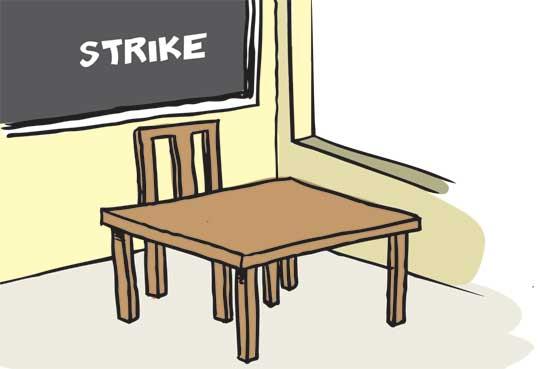Reply To:
Name - Reply Comment
Teachers and principals in Sri Lanka continue to agitate for being underpaid and such actions are just what the media spot and highlight. 
So now we know, through newspapers, that the teachers and principals have reason to be angry and its about their pay.
But what about the plight of children who have to be in
classrooms unsupervised?
Wednesday (February 26) was such a day because teachers and principals were busy assembling at the G.H Buddhadasa Stadium in Battaramulla with the agitators later holding a protest in from of the Education Ministry. According to follow up reports a work to rule campaign was scheduled to be carried out yesterday (Thursday) between 8.30 am and 1.30pm.
Strikes by teachers must be considered from various angles. One perspective is the loss of work for children due to agitations by teachers. The other angle is the sacrifice teachers make to settle for a low income profession to serve the nation in nurturing young minds. Like in any issue there are the pros and the cons in this teacher strike issue. We’ll take the cons first. This is because children are our assets and we expect the teachers to make a sacrifice for their chargers.
It’s these students who are working hard to gain university entrance. When students are compared with those spreading knowledge, the teachers have got their degrees or completed their education; hence it is unfair for the qualified academics to put the futures of students in jeopardy. The students are taught at home that the teachers are their second parents, but would ‘parents’ leave their ‘children’ idling in classrooms?
Accepting the appointment as a teacher is akin to taking an oath; which implies that the ‘guru’ is bound to endure all hardships to ensure that the succession of knowledge from teacher to student continues from one generation to another.
Only good habits should be passed on from one generation to the other. In this context the writer doesn’t imply that a strike or work to rule is something bad. But agitations by teachers and principals can certainly be avoided.
Just the other day President Gotabaya Rajapaksa was quoted in newspapers saying that he wished to increase the number of national schools from 373 to 1000. The president also wants to have graduate teachers serving in these new schools which would be built soon; according to him these institutes would be built within the next two years.
One thing that the president has to do if he wishes to increase the number of national schools is to make this teaching profession a lucrative occupation. Teacher aspirants are living in a high-tech world of opportunity. Constant teacher strikes paint a negative picture about the teaching profession. The government must be aware that the needs of would be teachers go beyond serving in education and include living a prosperous life inclusive of basic comforts.
As many as 26 associations represented by either teachers or principals were agitating these days. The large number of associations going on strike suggests that those serving in academic institutes have some grouse or another. An unhappy teacher amounts to lessons being taught with a half-hearted effort.
The teachers are demanding an allowance be paid till their salary anomalies are sorted out. This is a nation where lawmakers serve themselves by ordering the most expensive vehicles and enjoy living in luxury housing complexes. And a good number of them hasn’t passed even the GCE Ordinary Level Examination. In a way its time that these qualified teachers and principals received a decent wage which would be subject to adjustments made to reflect rises in cost of living.